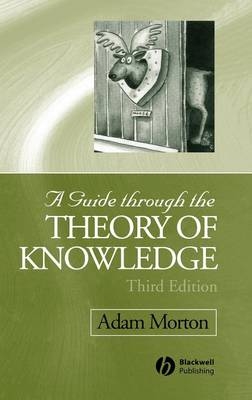
A Guide through the Theory of Knowledge
Wiley-Blackwell (Verlag)
978-1-4051-0011-3 (ISBN)
The third edition of this highly acclaimed text is ideal for introductory courses in epistemology. Assuming little or no philosophical knowledge, it guides beginning students through the landmarks in epistemology, covering historically important topics as well as current issues and debates.
Adam Morton is Professor of Philosophy at the University of Oklahoma. His publications include Frames of Mind (1980), Disasters and Dilemmas (Blackwell, 1991), and Philosophy in Practice: An Introduction to the Main Questions (Blackwell, 1995).
Foreword for Students. Acknowledgments.
1. Beliefs And Their Qualities:.
Defending and Attacking Beliefs.
Epistemic Ideals.
The Basic Concepts.
The Basic Questions of The Theory Of Knowledge.
Two Extreme Views.
2. Perception:.
The Issues.
The Concepts.
Empiricism.
Some Experiments.
Evidence Without Certainty.
What is Special About Perception?.
3. Apriori Beliefs:.
Knowledge Just By Thinking.
Apriori, Analytic, Necessary.
Kant on the Synthetic Apriori.
Quine on the Analytic/Synthetic Distinction.
Conceptual Truths.
The Uses of Reasoning.
4. Inductive Reasoning:.
Simple Induction.
Hume's Problem.
Goodman's Problem.
Sampling.
Solutions to Goodman's Problem.
Justifying Induction.
The Safeness of Induction.
IBE.
Safeness Reconsidered.
5. Middleword: Fallibilism:.
Error versus Ignorance.
Foundationalism versus Holism.
Fallibilisms.
How the Web Changes.
6. Defining Knowledge:.
Top-grade Belief.
Lehrer's Principle.
Reliability: The Case of the Ancient Mariner.
Missing Information.
Knowledge and Trust.
7. Externalism and Epistemic Virtues:.
The Escape from Justification.
Externalism.
Cousins of Knowledge.
Skepticism and Knowing that You Know.
Virtues.
The Externalist Attitude.
8. Knowledge Of Minds:.
Psychological Beliefs.
Self-centered Theories.
Behavioral Theories.
Folk Psychology.
Materialist Theories.
Errors of Self-attribution.
Dispositions, Occurrences, and Reliability.
Conclusion: The Indispensability of Psychology.
9. Moral Knowledge:.
Knowing Right from Wrong.
Thick and Thin Moral Beliefs.
Analogies: Color, Humor, and Witches.
Cognitivsm.
Knowing What You Know.
10. Bayesian And Naturalist Theories:.
Why Probability?.
A Guide Through The Theory Of Probability.
The Bayesian Picture of Evidence.
Objections to Bayesianism.
Background Beliefs.
Rationality Naturalized.
Bayesianism vs. Naturalism.
11. Afterword: Some Future Epistemology:.
Definitions.
Appendix for Teachers.
Index.
| Erscheint lt. Verlag | 12.7.2002 |
|---|---|
| Verlagsort | Hoboken |
| Sprache | englisch |
| Maße | 159 x 236 mm |
| Gewicht | 435 g |
| Themenwelt | Geisteswissenschaften ► Philosophie ► Erkenntnistheorie / Wissenschaftstheorie |
| ISBN-10 | 1-4051-0011-7 / 1405100117 |
| ISBN-13 | 978-1-4051-0011-3 / 9781405100113 |
| Zustand | Neuware |
| Haben Sie eine Frage zum Produkt? |
aus dem Bereich

![Was heißt Denken?. Vorlesung Wintersemester 1951/52. [Was bedeutet das alles?] - Martin Heidegger](/media/113619842)
